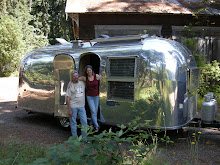 Bottled Water...many of us use it everyday. But all of us know that not only are the bottles one of the most prolific forms of plastic pollution on the planet, the water is no better for you than most tap water, it is expensive, and there is fear of chemical leaching from some types of bottles.
Bottled Water...many of us use it everyday. But all of us know that not only are the bottles one of the most prolific forms of plastic pollution on the planet, the water is no better for you than most tap water, it is expensive, and there is fear of chemical leaching from some types of bottles.As we travel, staying hydrated is very important. To solve the problem of using and disposing of plastic bottles, we decided on a very simple and cost effective solution. First we purchased a Britta Filter Dispenser that fit in our fridge. Next we visited REI and bought two stainless steel reusable water bottles that have a very nice resealable drinking nozzle. Every morning before we hit the road we fill our bottles and refill the dispenser so that we will have plenty of water for the day.
At the average price of about 25 cents a bottle, and the average consumption of 3-4 bottles a day per person, we will pay for our investment in about 40 days. Even with the cost of new filters, this will still keep the cost of water way below the plastic bottled kind and none of our bottles will end up in a landfill. Preserve has instituted a recylcing program for used filters and Whole Foods among others now has a drop-off for used filters in their stores.
We urge everyone to look for a solution to their bottled water consumption. If you don't feel guilty, you should!
For more information on bottled water visit:
5 Reasons Not to Drink Bottled Water
Get Off The Bottle!
And for a little fun:
Don't Go Near The Water!




